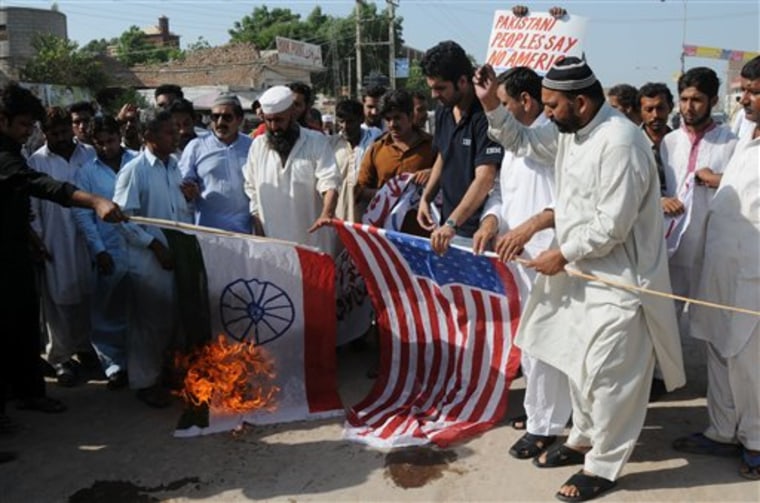Pakistan's army chief convened a special meeting of senior commanders Sunday following U.S. allegations that the military's spy agency helped militants attack American targets in Afghanistan, the army said.
The government also summoned home the country's foreign minister early from a trip to the United States to attend a meeting of all major political parties to discuss the American allegations of support for the militant Haqqani network.
Senior Pakistani officials have lashed out against the allegations, accusing the U.S. of trying to make Pakistan a scapegoat for its troubled war in Afghanistan. The public confrontation has plunged the already troubled U.S.-Pakistan alliance to new lows.
Pakistan's leaders have shown no indication they plan to act on renewed American demands to attack the Haqqani network in its main base in Pakistan, even at the risk of further conflict with Washington, which has given the country billions in aid.
U.S. officials have implied that American forces could carry out unilateral raids inside Pakistan against the Haqqani network, operations that could have explosive implications in a country where anti-American sentiment is widespread.
Pakistanis were outraged by the covert U.S. commando raid that killed al-Qaida chief Osama bin Laden in a garrison town not far from Islamabad in May. The U.S. did not tell the Pakistani government about the operation beforehand for fear bin Laden would be tipped off.
Pakistani Interior Minister Rehman Malik warned the U.S. on Sunday against sending troops into Pakistan.
"Any aggression will not be tolerated," Malik told reporters in Islamabad. "The nation is standing united behind the armed forces, which is the front line of Pakistan's defense."
The top U.S. military officer, Adm. Mike Mullen, last week accused Pakistan's Inter-Services Intelligence agency of supporting Haqqani insurgents in planning and executing a 22-hour assault on the U.S. Embassy in Afghanistan on Sept. 13 as well as a truck bomb that wounded 77 American soldiers days earlier.
Pakistan's army chief, Gen. Ashfaq Pervez Kayani, widely considered the most powerful man in Pakistan, has dismissed the allegations, saying they were baseless and part of a public "blame game" detrimental to peace in Afghanistan.
Pakistan army spokesman Maj. Gen. Athar Abbas said Kayani presided over Sunday's commanders meeting but would not provide detail on the discussions.
Later in the day, Prime Minister Yousuf Raza Gilani's office issued a statement saying Foreign Minister Hina Rabbani Khar was summoned back to attend a meeting of all major political parties on "threats emanating from outside the country."
Gilani slapped down the U.S. allegations in a separate statement issued late Saturday.
"We strongly reject assertions of complicity with the Haqqanis or of proxy war," Gilani said in a statement. "The allegations betray a confusion and policy disarray within the U.S. establishment on the way forward in Afghanistan."
Pakistan claimed to have severed its ties with Afghan militants after the 9/11 attacks and supported America's campaign in Afghanistan, but U.S. officials have long suspected it maintained links. The comments by Mullen, who is chairman of the Joint Chiefs of Staff, were the most serious yet accusing Pakistan of militant ties, although he didn't cite any specific evidence.
Despite the seriousness of the U.S. claims, which appear to accuse Pakistan of state-sponsored terrorism, Mullen and other U.S. officials have said Washington needs to keep engaging with Islamabad, a reflection of its limited options in dealing with the country. Washington is also concerned about the danger of further instability in the nuclear-armed state.
The head of U.S. Central Command, Gen. James Mattis, called for continued cooperation after a meeting with Kayani in Islamabad. In a statement issued Sunday by the U.S. Embassy, Mattis emphasized "the need for persistent engagement among the militaries of the U.S., Pakistan and other states in the region."
Mattis also met with the Pakistani military's chief of staff, Gen. Khalid Wynne, who expressed his concern about "negative statements emanating from the U.S." and stressed the need to address "the irritants in the relationship," according to a statement issued by the military.
Around half of the U.S. war supplies to Afghanistan are trucked over Pakistani soil, and even as it accuses Islamabad of complicity with Afghan insurgents, Washington knows that it will likely need Islamabad's cooperation in bringing them to the negotiating table.
Gilani also called for greater cooperation.
"Let's avoid mutual recrimination and recommit ourselves to working together for eliminating terrorism and for reconciliation and peace in Afghanistan," he said.
___
Associated Press writers Chris Brummitt and Zarar Khan contributed to this report.
